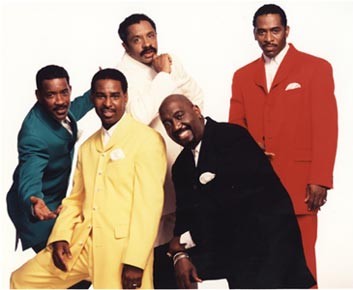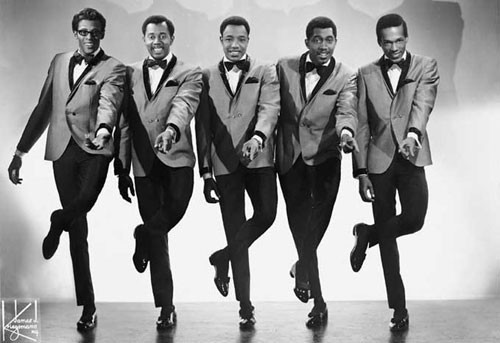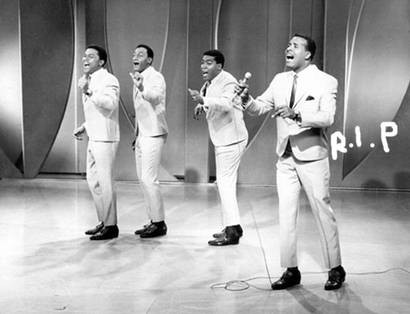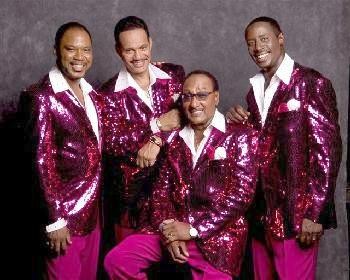The Temptations and the Four Tops at Ravinia Festival
Motown Lives in Chicago Battle of the Bands
By: Susan Hall - Aug 10, 2009
The Temptations and the Four Tops
Ravinia Festival,
Highland Park, Illionois
Highland Park, Illionois
August 7, 2009
It wasn't just my imagination when Otis Williams, Terry Weeks, G.C. Cameron, Ron Tyson and Joe Herndon stepped onto the stage. The Temptations had arrived, among them one original member, Otis Williams, who has been with the group for about fifty years.
Five like-dressed men in black and white striped suits held their mikes close and executed the synchronized move of the hips at a right angle, slid a foot up on the toe and began the Temptations' Walk. Streetwise steps had early on been converted to the smooth moves now on stage. (Would Michael have moon-walked if this group hadn't shown the way?) Lovingly performed by Otis Williams and descendants of the original group, the walk proves that all the Temps who have gone before are not forgotten -- not by a grateful public, nor by the men who carry their legacy on to a new generation.
The Four Tops have been around even longer -- and are also standard bearers for breathtaking harmonies, stylish choreography and vocal leads who thrill. Even their session players (often not credited) set a standard for virtuosity and discipline that's still a benchmark today.
In developing a style, both groups melded the falsetto of gospel, rhythm and blues, big band jazz and pop. The driving beat has always made it tough for listeners to sit still. Sometimes criticized as formulaic, in fact a large and varied body of work has been produced.
The subtext, evident at Friday's performance, is the audience these groups draw. Long before GatesGate and beers at the White House, before Rodney King and "Why can't we all get along," before "I Have a Dream" and Pettus Bridge in Selma and Bull Connor's hoses, The Four Tops and The Temptations offered up an innocent and evocative way to end Jim Crow. Go on YouTube and you'll see lily-white Eisenhower-era teens along with their counterparts from the 'hood rapt in the music of these groups. Does it surprise that the Illinois home of our current President can pull a similar crowd today? These two singing groups have always drawn old and young, white and black, because they're simply wonderful. Music integrates.
History lessons were hardly the point on Friday, except when they drew out memories of the first time you heard "Ain't Too Proud To Beg," "Girl, Why You Wanna Make Me Blue," "My Girl," and yes, "Just My Imagination."
The Temptations have gone through many personnel changes over the years, but their brand still honors the past and refreshes for the present. The soaring voice of tenor Ron Tyson is perhaps the best in the business. "The Temps have always been known for great lead singers," says Williams. "Great singing will always prevail."
Like the Temps, the Four Tops bring emotions to the fore with grit. Their love lyrics leave adolescence behind. "Baby I Need Your Loving," "Something About You," "Bernadette," "Are You Man Enough." Are you, they ask. Some men were caught snoozing as the love instructions were sung out, but their partners were not! They danced both in their seats (no mean feat) and standing in the aisles, accompanying the beat with vintage hand movements -- the windshield wipers.
The Four Tops had the same four faces for forty years, so it's harder for some fans to accept change. Abdul "Duke" Fakir is the only original still singing. Theo Peoples, who did a tour of duty with the Temps, has joined them. Ronnie McNair and the son of original member Lawrence Payton complete the group. As an added treat on Friday, Fakir introduced his very young granddaughter, who accompanied on her violin for one number.
Today's singers make a hand-to-heart-and-to you move a bit too often, but who else can get down with "Reach Out, I'll be There." Will I ruin the party by noting that the interval of an ascending 4th which begins the phrase "I'll be there" followed by a quick descent of a 5th was used by both Elgar and Mahler to create the same disturbing, yearning, evocative effect?
At the end of the evening, the Four Tops were knee-deep in audience, eager to connect, to touch, to be part of this extraordinary musical legacy. I was there.





